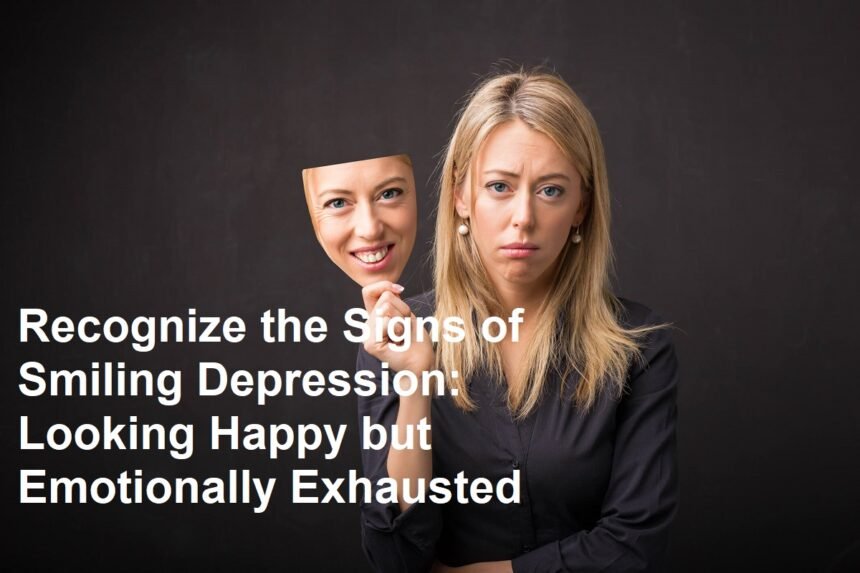Introduction
Have you ever noticed someone who always seems upbeat, energetic, and “fine” on the outside—yet deep down, they’re silently struggling? This is often known as smiling depression. People experiencing this condition hide their pain behind a smile, making it incredibly hard for others (and sometimes even themselves) to recognize that something is wrong.
In this article, we’ll explore how to recognize the signs of smiling depression: looking happy but emotionally exhausted, share expert explanations from psychologists about why it’s dangerous, and offer practical prevention steps that you can use to protect your emotional well-being.
What Is Smiling Depression?
Expert Explanation from Psychologists
Psychologists define smiling depression as a form of depression where individuals appear outwardly happy and functional while inwardly battling sadness, emptiness, or fatigue. Unlike typical depression, which often shows through visible withdrawal or low energy, smiling depression can be hidden behind laughter, achievements, and social activity.
The real danger lies in its invisibility. Because people with smiling depression mask their emotions so well, they often go unnoticed until their struggles escalate into a severe mental health crisis.
Key Signs of Smiling Depression
Even though it’s masked, there are subtle signs worth paying attention to:
1. Constant Smiling, Hidden Sadness
They smile and laugh with others, but their eyes often reflect tiredness or emptiness.
2. High Functioning but Overcompensating
They may look successful, hardworking, and socially active—using achievements as a shield to cover inner struggles.
3. Emotional Exhaustion
After socializing or completing tasks, they feel deeply drained, even if they appeared cheerful in the moment.
4. Trouble Sleeping
Insomnia, restlessness, or poor sleep quality despite looking “fine” during the day.
5. Loss of Joy in Solitude
They can laugh in a crowd but feel hollow when alone.
Why Smiling Depression Is Dangerous
Hidden Struggles, Higher Risks
Because it’s not easily visible, smiling depression often goes untreated. Psychologists warn that this increases the risk of:
- Severe anxiety and burnout.
- Emotional breakdowns.
- Harmful coping mechanisms.
Social Misunderstandings
Friends and family may assume everything is fine because the person “looks happy,” delaying the support they truly need.
Practical Steps to Prevent and Manage Smiling Depression
1. Practice Honest Self-Reflection
Ask yourself regularly: Am I truly okay, or am I just pretending? Journaling or self-check-ins can help uncover hidden emotions.
2. Build a Support Network
Don’t always try to be the “strong one.” Share your feelings with trusted friends, family, or support groups.
3. Prioritize Rest and Balance
Overcommitting to work or social life is a common mask. Learn to set boundaries and rest without guilt.
4. Seek Professional Help
Therapists and psychologists can help identify triggers, create coping strategies, and provide safe spaces for healing.
5. Adopt Mindful Lifestyle Habits
Small practices like meditation, deep breathing, gentle exercise, and balanced nutrition can reduce emotional exhaustion.
Common Mistakes People Make
Mistake 1: Ignoring Emotional Red Flags
Brushing off inner sadness with “I’m fine” can deepen emotional wounds.
Mistake 2: Equating Success with Happiness
Achievements don’t always reflect mental well-being.
Mistake 3: Believing Asking for Help Means Weakness
Psychologists emphasize that seeking support is actually a strength, not a weakness.
Prevention Tips for Loved Ones
If you suspect someone you care about is dealing with smiling depression:
- Go beyond “How are you?” and ask meaningful, open-ended questions.
- Listen without judgment.
- Gently encourage professional help.
- Remind them they don’t need to face life’s challenges alone.
Conclusion
Smiling depression is a hidden battle. Learning to recognize the signs of smiling depression: looking happy but emotionally exhausted is the first step toward preventing deeper struggles. With awareness, expert guidance, and practical steps, you can protect your mental health—or support someone you care about before it’s too late.
Take a moment this week to reflect: Are you smiling on the outside but feeling exhausted inside? Try journaling your emotions daily for seven days, then look for patterns. Share your experiences with others—you never know, your story might inspire someone else to seek help.












